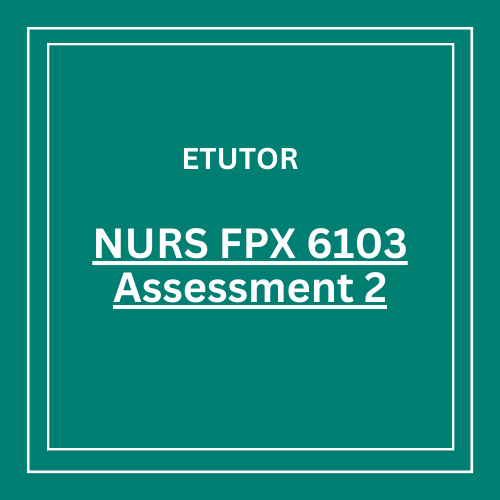Name
Capella University
NURS-FPX6103: The Nurse Educator Role
Instructor’s Name
October, 2024
Applying the Tripartite Model
Of all the models used in the evaluation of the roles and productivity of nursing professors, one of the most elaborate is the Tripartite Model of the annual performance assessment. It focuses on three core areas: teaching, service, and, research. All of them contribute to the development of professional status and the impact of nurse educators within their profession and environment (Jarosinski et al., 2022). This model will seek to determine how these areas fit in Nursing Education and how proper practices that will enhance quality teaching, service delivery, and research can be enhanced. Thus, evaluating these components allows judging their work in terms of important factors, such as faculty tenure and promotion.
Specific Nurse Educator Role
In this case, the focus is given to the clinical nursing educator’s position at an academic institution. These teachers are accountable for observing clinical learning by students, describing how knowledge is applied, and securing affiliations with healthcare entities for practical training (Jarosinski et al., 2022). Clinical nursing educators also engage in research and write papers, perform community services, and act on committees. This resonates with the tripartite model where the assessment of faculty is done on teaching, service, and scholarship which is associated with tenure and career progression.
Evaluation of the Teaching, Service, and Scholarship Roles of Clinical Nursing Instructors
Clinical nursing educators are some of the most important forces in nursing education, teaching, research, and service. The skills that high-quality teaching includes are the ability to encourage critical thinking, help students learn how to apply knowledge in practice and use work simulations to interest the learners (Smith et al., 2021). Service in nursing education has a significant role in creating a student and colleagues-centered culture in academic learning environments through teaching and supporting the students and colleagues. As scholars qualified to educate clinical nurses, it is assumed that educators should engage in research, and disseminate information and knowledge in the practice of nursing. This research-based approach makes certain the careers of these educators are relevant to the nursing profession through the bridge between school and clinical settings.
Plan for Meeting Aspects of the Tripartite Model
For clinical nursing educators to pursue the tenets of the tripartite model, it is possible to engage in a multifaceted strategy that involves use of the reflective practice, the use of research-informed practice, and the promotion of continuous professional development (Smith et al., 2021). Motivational strategies that can be used by educators to enhance students’ performance and their clinical skills include simulation into the course, giving a lecture and clinical teaching and assessment as well as constructive feedback (Courville et al., 2023). Further, clinical nursing educators should engage in professional development to update themselves with knowledge on emerging trends in clinical nursing education, and to give rise to new pedagogy.
In the context of service roles, one may find that he or she is engaged in one or more professional associations, university committees, and community activities (Horning et al., 2020). This could include curriculum development, supporting accreditation, faculty development of junior faculty members, and assisting healthcare organizations to meet the needs of the industry.
Implications of Not Addressing the Tripartite Model
Non-establishment of any of the three parts of the tripartite model has professional implications. For instance, if the scholarship component is ignored then clinical nursing educators remain with fewer career development chances, generate less knowledge of nursing, and have fewer chances of tenure and promotions (Horning et al., 2020). Likewise, incompetence in teaching or service delivery will help mold the students in the wrong way and reduce the reputation of the nursing education program. Given this, it is necessary to apply the three-part model to obtain the desired result, that is, to achieve career success.
Explanation of Opportunities for Scholarship
Clinical nursing educators need to engage more actively in the discovery, dissemination, and promotion of nursing knowledge, research, and education. The following are several major ways through which such educators can develop their scholarly practice.
Research on Best Practices in Clinical Teaching
Another promising avenue for clinical nursing educators is to be able to study the course of effective clinical instructing on pupils. It could be to find ways of increasing teaching effectiveness, assess the available technologies for clinical teaching, and analyze the effects of using such methods on students’ performance (Shahzad et al., 2022). It means that by finding out what works, educators can contribute to enhancing the effectiveness of the nursing education experience and the overall knowledge of nursing.
Publications in Peer-Reviewed Journals
Clinical nursing educators can contribute their findings in well-reputed and accredited refereed journals in nursing and health care education. For instance, some journals such as Internal Public Health and Environmental Research Journal constantly publish articles regardless of the instructional design and education innovations or assessment of the clinical teaching methodology (Tehranineshat et al., 2022). Publishing articles in such journals not only shares useful knowledge with others but also improves the status of the educator. Publishing research assists educators in getting acknowledgment in their line of work and also guarantees their knowledge has a rich effect on the practice of nursing education.
Presenting at Conferences
However, clinical nursing educators can also share their research outcomes at national and international conferences. Educational events such as the National League for Nursing (NLN) Education Summit are perfect avenues through which these educators can share their ideas, meet other professionals in the field, and directly discuss approaches to delivering education for the nursing profession (Tehranineshat et al., 2022). These conferences serve as platforms for collaboration and information sharing which expand the development of nursing scholarship more fully. They also get an opportunity to present their findings at such forums thus creating market visibility of their work and confirming them as experts in their discipline.
Networking and Professional Development
Another benefit of participation and publishing research is also academic business networking and professional development in conferences. Other professionals in the field could offer opportunities for working together, writing joint articles, as well as the next research activities (Turan & Çekiç, 2023). These opportunities make it easier for clinical nursing educators to update themselves on new trends and developments in clinical nursing education and also get to network with many professionals. Educators need to be current with the progress of healthcare education; thus, this continual participation in academic and clinical nursing assists in keeping educators in touch with current changes in practice.
Continuing Education and Advanced Certifications
While proving that clinical nursing educators can also seek higher academic qualifications to contribute to scholarship. A DNP or a Ph.D. in Nursing Education prepares educators for the task of performing research at a high level due to the theoretical base they receive (Turan & Çekiç, 2023). Educators may also benefit from certifications in areas like instructional design or simulation-based education, which can enhance their teaching strategies and improve the quality of nursing education.
Qualifications as a Change Agent
Graduate Education and Clinical Experience
It is appropriate for clinical nursing educators to have a graduate degree in nursing, whether it is a Master’s or a Doctorate since they require fundamental knowledge to design and apply strategies towards teaching (Wenzel et al., 2022). In addition to certifications and degrees, experiential knowledge allows faculty members to appreciate challenges within the health system and improve on the development of courses that meet present and future needs. This give-and-take between academia and practical experience assists educators in complying with nursing programs with present-day practice.
Leadership and Communication Skills
Effective leadership qualities offer importance to clinical nursing educators who intend to implement change in nursing education. They should be able to lead, encourage creativity, and make decisions that will help their teams support student needs as well as the larger health fraternity (Voss et al., 2021). This role is well supported by excellent communication as educators bear the responsibility of disseminating information, initiating discussions with various stakeholders as well as promoting change when required to transform the nursing education system by adapting to change in the healthcare sector.
Collaboration and Advocacy for Educational Reforms
Nurse collaboration is important in education where the use of teamwork is vital in the enhancement of new practices in institutions (Alharbi et al., 2021). Clinical nursing educators collaborate with other staff members; leaders and healthcare affiliates to advocate changes and enhancements of curricula and educational systems (Laugaland et al., 2021). Through calling for and supporting change towards what is currently important in healthcare and the culture of society whether that change is concerning diversity or the integration of technology in our schools, our educators are an essential part of the forward movement of nursing education and therefore the improvement of patient care.
NURS FPX 6103 Assessment 2 Conclusion
In conclusion, the conflict resolved through the Tripartite Model focuses on clinical nursing education on the criteria in which teaching, service, and scholarship should equally contribute toward performance. Lastly, the focus on all three domains mentioned above will allow clinical nursing educators to meet all the expected and required leadership, scholarship, and education responsibilities (Tang, 2021). This model offers a good guide for systematic planning to lead to the proper preparation of the nursing faculty, who are expected to deliver an approved quality of education and serve academic and practice communities by offering important scholarly and service contributions to the nursing profession.
NURS FPX 6103 Assessment 2 References
Alharbi, M., Kuhn, L., & Morphet, J. (2021). Nursing students’ engagement with social media as an extracurricular activity: An integrative review. Journal of Clinical Nursing, 30(1-2), 44–55.https://onlinelibrary.wiley.com/doi/10.1111/jocn.15503
Courville, K. A., Lowe, A., Dannelley, B., Sellers, J., & Deal, B. (2023). Learning-by-teaching and service learning to promote bleeding control education: An academic-community partnership. Nurse Educator, 48(2), E59–E63.https://journals.lww.com/nurseeducatoronline/fulltext/2023/03000/learning_by_teaching_and_service_learning_to.31.aspx
Horning, M. L., Ostrow, L., Beierwaltes, P., Beaudette, J., Schmitz, K., & Fulkerson, J. A. (2020). Service learning within community-engaged research: Facilitating nursing student learning outcomes. Journal of Professional Nursing: Official Journal of the American Association of Colleges of Nursing, 36(6), 510–513.https://sciencedirect.com/science/article/abs/pii/S8755722320300843?via%3Dihub
Jarosinski, J. M., Seldomridge, L., Reid, T. P., & Willey, J. (2022). Nurse faculty shortage: Voices of nursing program administrators. Nurse Educator, 47(3), 151–155.https://journals.lww.com/nurseeducatoronline/fulltext/2022/05000/nurse_faculty_shortage__voices_of_nursing_program.6.aspx
Laugaland, K., Kaldestad, K., Espeland, E., McCormack, B., Akerjordet, K., & Aase, I. (2021). Nursing students’ experience with clinical placement in nursing homes: A focus group study. BMC Nursing, 20(1), 159.https://bmcnurs.biomedcentral.com/articles/10.1186/s12912-021-00690-4
Smith, Y., Chen, Y. J., & Warner-Stidham, A. (2021). Understanding online teaching effectiveness: Nursing student and faculty perspectives. Journal of Professional Nursing: Official Journal of the American Association of Colleges of Nursing, 37(5), 785–794.https://www.sciencedirect.com/science/article/abs/pii/S8755722321000818?via%3Dihub
Shahzad, S., Younas, A., & Ali, P. (2022). Social justice education in nursing: An integrative review of teaching and learning approaches and students’ and educators’ experiences. Nurse Education Today, 110, 105272.https://www.sciencedirect.com/science/article/pii/S0260691722000089?via%3Dihub
Tang, A. C. (2021). Learning experience of Chinese nursing students during clinical practicum: A descriptive qualitative study. Nursing Reports (Pavia, Italy), 11(2), 495–505.https://www.mdpi.com/2039-4403/11/2/46
Tehranineshat, B., & Torabizadeh, C. (2022). Dignity of nursing students in clinical learning environments. Nursing Ethics, 29(3), 742–757.https://journals.sagepub.com/doi/10.1177/09697330211041735
Turan, N., & Çekiç, Y. (2023). Ethics positions of nursing students in clinical decision-making. Nursing Ethics, 30(7-8), 1025–1037.https://journals.sagepub.com/doi/10.1177/09697330231161685
Voss, J., Yasobant, S., Akridge, A., Tarimo, E., Seloilwe, E., Hausner, D., & Mashalla, Y. (2021). Gaps, challenges, and opportunities for global health leadership training. Annals of Global Health, 87(1), 62.https://annalsofglobalhealth.org/articles/10.5334/aogh.3219
Wenzel, C., Melrose, S., Lane, A., & Kent-Wilkinson, A. (2022). Clinical instruction in mental health nursing: students’ perceptions of best practices. International Journal of Nursing Education Scholarship, 19(1), 10.1515/lines-2021-0147.https://www.degruyter.com/document/doi/10.1515/ijnes-2021-0147/html
Table of Contents
Toggle






